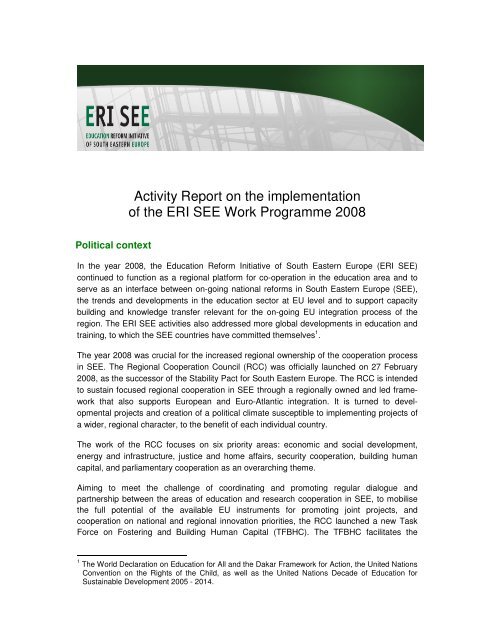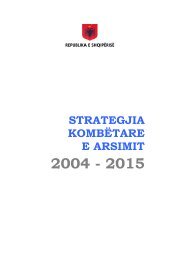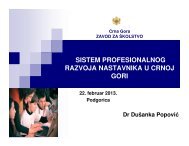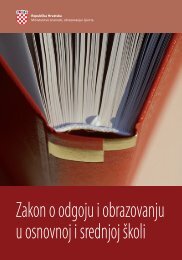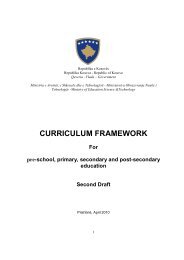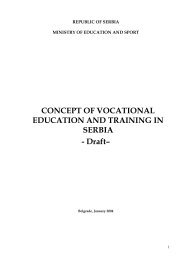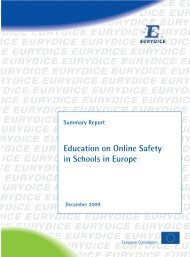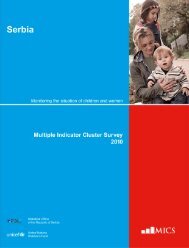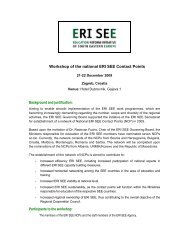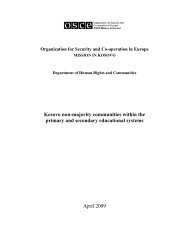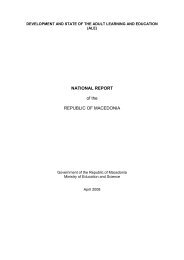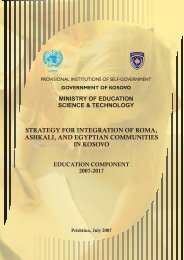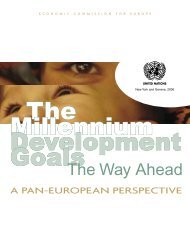ERI SEE Activities Report 2008
ERI SEE Activities Report 2008
ERI SEE Activities Report 2008
You also want an ePaper? Increase the reach of your titles
YUMPU automatically turns print PDFs into web optimized ePapers that Google loves.
Activity <strong>Report</strong> on the implementationof the <strong>ERI</strong> <strong>SEE</strong> Work Programme <strong>2008</strong>Political contextIn the year <strong>2008</strong>, the Education Reform Initiative of South Eastern Europe (<strong>ERI</strong> <strong>SEE</strong>)continued to function as a regional platform for co-operation in the education area and toserve as an interface between on-going national reforms in South Eastern Europe (<strong>SEE</strong>),the trends and developments in the education sector at EU level and to support capacitybuilding and knowledge transfer relevant for the on-going EU integration process of theregion. The <strong>ERI</strong> <strong>SEE</strong> activities also addressed more global developments in education andtraining, to which the <strong>SEE</strong> countries have committed themselves 1 .The year <strong>2008</strong> was crucial for the increased regional ownership of the cooperation processin <strong>SEE</strong>. The Regional Cooperation Council (RCC) was officially launched on 27 February<strong>2008</strong>, as the successor of the Stability Pact for South Eastern Europe. The RCC is intendedto sustain focused regional cooperation in <strong>SEE</strong> through a regionally owned and led frameworkthat also supports European and Euro-Atlantic integration. It is turned to developmentalprojects and creation of a political climate susceptible to implementing projects ofa wider, regional character, to the benefit of each individual country.The work of the RCC focuses on six priority areas: economic and social development,energy and infrastructure, justice and home affairs, security cooperation, building humancapital, and parliamentary cooperation as an overarching theme.Aiming to meet the challenge of coordinating and promoting regular dialogue andpartnership between the areas of education and research cooperation in <strong>SEE</strong>, to mobilisethe full potential of the available EU instruments for promoting joint projects, andcooperation on national and regional innovation priorities, the RCC launched a new TaskForce on Fostering and Building Human Capital (TFBHC). The TFBHC facilitates the1 The World Declaration on Education for All and the Dakar Framework for Action, the United NationsConvention on the Rights of the Child, as well as the United Nations Decade of Education forSustainable Development 2005 - 2014.
dialogue and cooperation in this priority area and works on promotion of coherency andcoordination between the relevant areas and stakeholders.On the occasion of the Informal Conference of European Ministers of Education in Oslo (5-6June <strong>2008</strong>), the Ministers of education from <strong>SEE</strong> signed the Joint Statement on BuildingHuman Capital and Promoting Diversity through Dialogue, Creativity and Innovation. Theyreaffirmed their willingness to contribute to strong regional and European partnershipswithin the RCC of the South Eastern European Cooperation Process (<strong>SEE</strong>CP) and pledgedto support its work as members of its new Task Force Fostering and Building HumanCapital and of the Education Reform Initiative of South Eastern Europe.The above mentioned developments strongly influenced the work of <strong>ERI</strong> <strong>SEE</strong> in <strong>2008</strong>. Thisreport intends to make a syntesis of the activities that were organised and coordinated bythe <strong>ERI</strong> <strong>SEE</strong> Agency in the period January-December <strong>2008</strong>. The implementation of theactivities was made possible and is a result of the joint efforts and work with the experts ofthe Stability Pact Task Force Education and Youth/Regional Cooperation Council TaskForce Building Human Capital (as successor of the TFEY launched in June <strong>2008</strong>), theMinistry of Science, Education and Sports of the Republic of Croatia, the donors of theInitiative members of the <strong>ERI</strong> <strong>SEE</strong> Consultative Body (Austria, The Netherlands, Norway,and Switzerland), and all <strong>ERI</strong> <strong>SEE</strong> members: Bulgaria and Romania as EU Member Statesand donors, as well as Albania, Bosnia and Herzegovina, the Republic of Macedonia,Moldova, Montenegro, UNMIK/ Kosovo and Serbia. The <strong>ERI</strong> <strong>SEE</strong> Agency expresses appreciationand gratitude for the intensive cooperation and support witnessed in the processof realisation of the activities and the implementation of the Work Programme <strong>2008</strong>.1. Adoption of the <strong>ERI</strong> <strong>SEE</strong> long-term goal, mid-term objective andoutputs <strong>2008</strong>-2010In May <strong>2008</strong> the <strong>ERI</strong> <strong>SEE</strong> Governing Board and Consultative Body adopted the long-termgoal, mid-term objective and outputs <strong>2008</strong>-2010. The <strong>ERI</strong> <strong>SEE</strong> Work Programme <strong>2008</strong> wasdeveloped around the five agreed outputs:Output 1:Output 2:Output 3:Output 4:Output 5:<strong>ERI</strong> <strong>SEE</strong> members are informed on lifelong learning (LLL) initiatives in theregion and had the opportunity to develop a common strategyInformation on the European Qualification Framework and on the developmentof National Qualification Frameworks in the <strong>SEE</strong> region has been providedThe issues of quality and equity in education are promoted and strongnetworks have been establishedThe knowledge triangle (research, education and innovation) hasstrengthened in South Eastern EuropeThe Education Reform Initiative of South Eastern Europe is recognised as areliable regional partner in the education sector of South East Europe.2
2. Implementation of the <strong>ERI</strong> <strong>SEE</strong> activities under the five <strong>ERI</strong> <strong>SEE</strong> outputsDifferent activities were developed in the <strong>SEE</strong> region, in cooperation and with support of therespective national authorities, experts from the <strong>ERI</strong> <strong>SEE</strong> donor countries, the Council ofEurope, the European Training Foundation and the OECD in the areas identified as priorities.Output 1: <strong>ERI</strong> <strong>SEE</strong> members are informed on lifelong learning initiatives inthe region and had the opportunity to develop a common strategy<strong>Activities</strong> implemented:2.1.1. Regional seminar “Use of Project Cycle Management – an important toolfor successful co-operation in the fields of education and training”,Belgrade, Serbia, 23-24 October <strong>2008</strong>As part of the <strong>ERI</strong> <strong>SEE</strong> capacity building measures for participation in the Community programmesin education and training targeting the expert network established with theworkshops and study visits organised in the period 2005-2007, this seminar took place inBelgrade, Serbia, on 23 and 24 October <strong>2008</strong>. It was continuation of the training on ProjectCycle Management (PCM) and enabled refreshment of the knowledge on different PCMphases.Total of 16 representatives of Croatia, Montenegro, the Republic of Macedonia and Serbia,as well as experts-trainers from The Netherlands (key expert, trainer and moderator of theevent), Slovakia and Romania took part to the seminar.The seminar focused on planning the project implementation (defining the activities neededto achieve the project objective, specification of resources needed and development of costschedules). A Leonardo da Vinci project was used for practical work and excercise. Theparticipants also had the opportunity to assess a project proposal submitted under thetransversal Lifelong Learning Programme action. This session aimed to support the expertsin the future tasks as assessors of project proposals in education and training.Added value to the discussion on the possibilities for future regional cooperation providedthe reach expertise of the leading expert Mr. Ton Farla, who has evaluated 60 projectssupported by the European Commission in different <strong>SEE</strong> countries.Recommendations for future regional cooperation:In order to support good governance, it is necessary to focus the capacitybuilding support on organising and facilitating the policy learning process,strategy formulation and policy action in the countries.A rigorous PCM approach based upon the logical framework as a primary set ofproject design and management tools is needed to support a more systematicand standardised approach.3
It is important to widen the concept of capacity building, not only by payingattention to training, but also to organisation of strategic development, humanresources development (HRD) policies and strategies, organisation managementand tools, production control processes etc.Training in leadership, HRD management, and writing policy related documentsis needed.Building knowledge on EC procedures and EC support programmes is needed.Strengthening the national capacities for writing Terms of Reference and otherprogramming documents (e.g. project fiche) is needed.The participants agreed a seminar on writing Terms of Reference and project fiche to beforeseen with the <strong>ERI</strong> <strong>SEE</strong> Work Programme 2009.2.1.2. First Networking Conference of the VET Agencies and Institutions ofSouth Eastern Europe, Tirana-Albania, 25-26 September <strong>2008</strong>VET contributes significantly to jobs creation, economic growth and social development, aswell as to personal development and social inclusion. It constitutes an important part oflifelong learning. In order to fulfil this major role, the VET systems in <strong>SEE</strong> are undergoingfundamental changes.The national efforts in <strong>SEE</strong>, continuously supported by expertise and projects jointly realisedwith relevant international institutions (e.g. ETF, World Bank, OECD), as well as basedon agreements for bilateral cooperation (e.g. KulturKontakt Austria, GTZ, USAID), havebrought relevant results in building the national VET systems: adoption and implementationof legislation and policies, establishment of national VET agencies and/or other institutionsat national, regional and local level, activities to increase the quality and attractiveness ofVET, relevance of curricula and qualifications to labour market needs and use of learningoutcomes based approaches, pathways to further and higher education, the learning andtraining needs of teachers and trainers, learning partnerships, social partners involvement,widening access and improving equity of participation, as well as increased opportunities forparticipation of disadvantaged groups.The diversity of the VET systems in <strong>SEE</strong> is an asset which serves as a basis for mutuallearning and support to future reforms. It calls for increased transparency and common understandingof the systems as a basis for building mutual trust, thus paving the way to mutualrecognition of qualifications and skills acquired in different countries of the region. Byputting efforts to use the European frameworks, instruments and tools, the <strong>SEE</strong> countrieswill increasingly enable their involvement in the common European Area of Education.The Tirana Conference brought together 41 top level officials and experts from the nationalagencies and institutions from Albania, Bosnia and Herzegovina, Bulgaria, Croatia, theRepublic of Macedonia, Moldova, Montenegro, Romania, UNMIK/Kosovo and Turkey 2 , as2 As a candidate country for EU Membership and a country which belongs to the <strong>SEE</strong>CP 2 ,Turkey will also be involved in the networking process.4
well as experts from Austria, the Netherlands, Norway and Slovenia, the European TrainingFoundation (ETF) and the <strong>ERI</strong> <strong>SEE</strong> Agency.The main objective of the Conference was to contribute to establishing a network of VETagencies/institutions of <strong>SEE</strong>.The Conference also enabled updating on the recent European developments and the <strong>SEE</strong>developments in the fields of qualifications frameworks and lifelong learning.The Conference contributed to:Better understanding of the current situation of VET in Europe and of the relevanceof sustainable networking of VET agencies and institutions in <strong>SEE</strong>;Acquiring knowledge on the lessons learned in the process of establishing of VETagencies and institutions in <strong>SEE</strong>, transfer of experiences of some EU Member Statesand better understanding of the main aspects of the work of the VET agencies;Discussion and agreement of a roadmap for development of sustainable mutual cooperationbetween the VET agencies and institutions of <strong>SEE</strong>;Understanding of the current situation of VET development in <strong>SEE</strong> and its role in thedevelopment of qualifications frameworks and lifelong learning, as well as to identificationof topics relevant for regional cooperation in both areas.In synergy with the activities of the European Training Foundation (ETF), continuation of thenetworking of the VET agencies and institutions of <strong>SEE</strong> was enabled at the special meetingorganized as part of the Conference “Implementation strategies for national qualificationsframeworks in South Eastern Europe“(Ankara, Turkey, 17-18 December <strong>2008</strong>).2.1.3. Special Networking session of VET agencies /institutions of SouthEastern Europe during the Conference “Implementation strategies fornational qualifications frameworks in South Eastern Europe“, Ankara,Turkey, 17-18 December <strong>2008</strong>On 17-18 December <strong>2008</strong> the ETF, together with the Vocational Qualifications Authority ofTurkey (MYK) and <strong>ERI</strong> <strong>SEE</strong>, organised a conference on implementation strategies for nationalqualifications frameworks (NQFs) in <strong>SEE</strong>. The implementation strategy of MYK was central tothe conference, which also focused on how to ensure the active involvement of sectors inNQFs, how to strengthen quality assurance, the assessment and certification processes,how to develop sustainable structures, and how to finance NQFs.Aiming to support the networking between the VET agencies and institutions of <strong>SEE</strong> whichwas initiated with the First Networking Conference which took place in Tirana, the Ankaraconference dedicated a special session to <strong>SEE</strong> networking (18 December). <strong>SEE</strong> representativesfrom Albania, Bulgaria, Croatia, the Republic of Macedonia, Montenegro, Romania,Serbia and Turkey, as well as representatives of the ETF, <strong>ERI</strong> <strong>SEE</strong> and the United Kingdomtook part to the meeting.All participants supported the networking initiative and agreed to continue the efforts at nationallevel for involvement of the respective national institutions as partners in the network.5
The discussion on the form of networking of <strong>SEE</strong> VET agencies and institutions developedaround the conclusions and recommendations of the Tirana conference and the draftMemorandum of Understanding of the regional network of VET agencies and similar institutionsof <strong>SEE</strong>, prepared by the National VET Agency of Albania.Future networking steps agreed:1. <strong>SEE</strong> Regional VET Network establishment:• Based upon the recommendations of the Tirana conference and the meeting inAnkara, the Director of the Romanian TVET Agency to prepare a draft cooperationagreement.• The Director of the National VET Agency of Albania to communicate the draft cooperationagreement to the respective <strong>SEE</strong> VET agencies and institutions for commentsand recommendations for improvement of the draft text.• Mid-February 2009 was foreseen as a period for signing the cooperation agreementof the <strong>SEE</strong> regional VET network.2. ETF support to the <strong>SEE</strong> Regional VET Network in 2009:• Support to all <strong>SEE</strong> countries in specific national aspects of development of the respectiveeducation and training systems in lifelong learning perspective, includingthe area of national qualifications frameworks;• Involvement of the <strong>SEE</strong> countries in the ETF regional initiatives on social inclusionthrough education and training, teaching and learning entrepreneurial learning, qualityassurance in VET, post-secondary education and adult learning.<strong>ERI</strong> <strong>SEE</strong> support to the <strong>SEE</strong> Regional VET Network in 2009:• The meeting of the regional <strong>SEE</strong> VET network which will take place in 2009 toaddress quality of education in the context of lifelong learning and its’ role in developmentof national qualifications frameworks.• The <strong>ERI</strong> <strong>SEE</strong> Agency to extend an invitation to the <strong>SEE</strong> VET agencies and institutionsfor participation in the <strong>ERI</strong> <strong>SEE</strong> e-moderated forums in different thematicareas.• The <strong>ERI</strong> <strong>SEE</strong> Agency to extend an invitation to the <strong>SEE</strong> VET agencies and institutionsfor participation in activities related to enriching the library of documentsrelevant for education and training development in <strong>SEE</strong> located on the <strong>ERI</strong> <strong>SEE</strong>website.It was recommended the ETF and the <strong>ERI</strong> <strong>SEE</strong> to continue the process of coordination ofthe regional activities in <strong>SEE</strong> with the objective to avoid overlapping of themes and to usethe human capacities in a rational way. For activities for which joint work would lead toadded value, both institutions are committed to develop appropriate partnerships.6
2.1.4. Preparations for establishing a network/forum of experts in lifelonglearningBuilding on the experience developed with the establishment and functioning of the <strong>ERI</strong><strong>SEE</strong> forums on assessment and evaluation, quality assurance in education and on theBologna Process, invitation for moderation of an <strong>ERI</strong> <strong>SEE</strong> forum on lifelong learning wasprepared.Relevant information on lifelong learning is provided via the <strong>ERI</strong> <strong>SEE</strong> web site(http://www.erisee.hr/docs_lifelong.html).Output 2: Information on the European Qualifications Framework and on thedevelopment of national qualifications frameworks in the <strong>SEE</strong>region has been provided<strong>Activities</strong> implemented:2.2.1. Exchange of information on EQF and the development of nationalqualification frameworks in <strong>SEE</strong> at the ETI <strong>SEE</strong> Governing Boardmeeting (Podgorica, Montenegro, 2 December <strong>2008</strong>)One working day of the Ninth meeting of the <strong>ERI</strong> <strong>SEE</strong> Governing Board and ConsultativeBody (Podgorica-Montenegro, 1-2 December <strong>2008</strong>) was dedicated to the qualificationsframeworks (QF). Experts on QF from relevant institutions (the ETF, the Federal Ministry ofEducation, Culture and Arts of Austria and the Council of Europe) provided inputs on: theworldwide process of NQF development, the novelties at European level and the implementationof EQF; the role of learning outcomes in the development of NQFs, as well as onthe Council of Europe coordinated regional network on qualifications frameworks in <strong>SEE</strong>.The members of the <strong>ERI</strong> <strong>SEE</strong> Governing Board from Bosnia and Herzegovina (BiH), Bulgaria,Croatia, Montenegro and Romania presented the national progress in the developmentof NQFs:• The Council of Europe and the European Commission project on strengthening highereducation (HE) in BiH has substantially contributed to a harmonised progress in thedevelopment of the QF for HE, quality assurance (QA) and recognition of qualificationsin HE. The Framework for Higher Education Qualifications in BiH (2007) defines thenational descriptors of the knowledge, skills and abilities associated with bachelor,masters and doctoral degrees. Two IPA funded projects will support the further developmentof the BiH NQF by 2010. The projects will cover: development of a framework lawon recognition of HE qualifications; legislation for QA and NQF in HE; implementing ageneric qualification framework in four fields of study; establishment of a network ofnational experts on QA and QF for HE; strengthening the institutional capacities for QAand recognition in HE. The EU project “VET System Reform III – Copenhagen Processin BiH” supports NQF development for lower educational levels, including the VETsector. Consultations with different actors are on-going.7
• Bulgaria has established a working group for NQF development. The framework is to belearning outcomes oriented and will be developed by 2010.• Croatia has adopted the guiding development document “Baseline of the CroatianQualifications Framework” (CROQF) in <strong>2008</strong>. It defines eight levels, some of which withsub-levels. A council has been established with representatives of all relevant ministriesand stakeholders. An operational team supports the work of the council. Awarenessraising campaign among the general public, as well as an information campaign targetingthe personnel involved in schools, companies and within the administration is ongoing.• The Government of Montenegro has adopted the Strategy for establishing NQF whichintroduces generic descriptors for each cycle based on learning outcomes, competencesand credit ranges. Intensive work on the implementation of the Strategy hastaken place in <strong>2008</strong>. A Montenegrin QF in line with the EQF is to be implemented by2010. The implementation of the Strategy builds on: cooperation between institutions;institutional capacity building; definition on levels, sub-levels and descriptors; key competences;QA; validation of informal and non-formal education, as well as intensive communicationand information of the wider public on the NQF.• For a longer period, Romania works on the development of the NQF. National structureshave been established and are accomplishing their role in the society. The NationalAdult Training Board has the role of a national Authority for Qualifications. The NationalCentre for Technical and Vocational Education Development contributes to the qualityand to the attractiveness of IVET in Romania. The National Agency for Qualifications inHigher Education and Partnership with Economic and Social Environment (ACPART) isresponsible for elaboration, implementation and updating the Romanian framework ofHE qualifications.Conclusions and recommendations for future activities:Having in view the dynamics and intensity of the work on NQFs development at Europeanlevel and in the respective countries, it was agreed the novelties and the progress made tobe discussed during the eleventh meeting of the <strong>ERI</strong> <strong>SEE</strong> Governing Board in 2009. Inorder to sustain the positive experience and to ensure high quality of the inputs, the <strong>ERI</strong><strong>SEE</strong> Agency to cooperate with QF experts from the ETF, EUA, and the donor countries inthe preparation of the event.<strong>ERI</strong> <strong>SEE</strong> to support the regional networking in the area of QFs by establishing an e-moderatedforum on QFs and by continuous updating of the content of the <strong>ERI</strong> <strong>SEE</strong> website withrelevant information on QFs.2.2.2. Provision of information on qualifications frameworkson the <strong>ERI</strong> <strong>SEE</strong> web siteRelevant documents on qualifications frameworks have been provided on the <strong>ERI</strong> <strong>SEE</strong> website (http://www.erisee.hr/docs_eqf.htm).8
2.2.3. Synergy of the <strong>ERI</strong> <strong>SEE</strong> activities with the activities of the Council ofEurope and the European Training FoundationThe communication and mutual informing on the activities in the region in the area of developmentof national qualifications frameworks were sustained in <strong>2008</strong>.Output 3: The issues of quality and equity in education are promoted andstrong networks have been established<strong>Activities</strong> implemented:2.3.1. Study visit to Croatia “Use of Information and CommunicationTechnologies in the Quality Assurance Processes of HigherEducation Institutions and Study Programmes”,Zagreb, Croatia, 18-19 December <strong>2008</strong>This study visit to Croatia was initiated at the <strong>ERI</strong> <strong>SEE</strong> Round Table on Accreditation inHigher Education (Zagreb, Croatia, June 2007). The participants recommended <strong>ERI</strong> <strong>SEE</strong> toorganise a study visit to Croatia in order enable better acquainting with the use of informationand communication technologies in the quality assurance processes of highereducation institutions and study programs, as well as with the information system of theAgency for Science and Higher Education of Croatia-MOZVAG.The <strong>ERI</strong> <strong>SEE</strong> Agency and the Agency for Science and Higher Education of Croatia jointlyorganised the study visit. The Agency for Science and Higher Education cooperated withthe Computer Center of the University of Zagreb (SRCE) and with the Faculty of Science ofthe University of Zagreb in the preparation of the event. The three institutions shared thetasks on presentation of different aspects of functioning of the ICT supported system ofquality assurance in higher education in Croatia.Total of 11 participants representing the Agency for Science and Higher Education of theRepublic of Croatia, the Computer Center of the University of Zagreb (SRCE), representativesof the respective institutions of Bosnia and Herzegovina and Montenegro, the Facultyof Science of the University of Zagreb and the <strong>ERI</strong> <strong>SEE</strong> Agency took part to the meetingsand presentations.The study visit enabled exchange of experience on the use of information and communicationtechnologies in the quality assurance processes at the level of higher educationinstitutions and at the level of study programmes in Croatia, Bosnia and Herzegovina andMontenegro. Specifically, the participants were acquainted with the organisation and thefunctioning of the Information System of the Croatian Higher Education Institutions (ISVU)and the Information System of the Agency for Science and Higher Education of Croatia(MOZVAG). The on-going work on the project for development of an integrated informationsystem for higher education and science in Croatia was also presented. An on-sitedemonstration of the use of ISVU by different stakeholders: teachers, students and administrativestaff took place at the Faculty of Natural Sciences of the University of Zagreb.9
2.3.3. Fourth Regional EDC Networking Conference for South EastEurope”Teacher Training and Intercultural Dialogue: Competences forteachers to enhance citizenship and human rights education”, Zagreb,Croatia, 12-13 JuneThe meeting was jointly organised by the Council of Europe, the Ministry of Science, Educationand Sports of the Republic of Croatia and the <strong>ERI</strong> <strong>SEE</strong> Agency.Established in 2006, today the <strong>SEE</strong> network of <strong>SEE</strong> coordinators of education fordemocratic citizenship and human rights education (EDC/HRE) involves an increasednumber of countries, the level of participants is higher in terms of commitment and knowledge,as well as increase of partnerships: universities, <strong>ERI</strong> <strong>SEE</strong>, ICRC, British Council,CIVITAS, the Wergeland Center in Oslo etc. The network operates side by side with othernetworks: the Baltic Black Sea Network and the Nordic Network.The Zagreb conference (33 participants in total) addressed: the theoretical concepts andmodels concerning intercultural competences and sensitivity; presentation of the Norwegian“Wergeland Center”, European Resource Centre on Education for Intercultural Understanding,Human Rights and Democratic Citizenship which aims to support and promote theCouncil of Europe’s work in these fields; presentation of CIVITAS, a worldwide organisationbased on partnerships and the materials developed by the British Council: “What is livingtogether?” under a large scale project to stimulate dialogue and cooperation in 25 countrieswith a focus on <strong>SEE</strong>.The <strong>SEE</strong> experts worked collaboratively in small groups aiming at offering positive criticismto the draft version of the CoE document “Empowering Teachers: Core Competence forEDC/HRE”. The suggestions and recommendations of the two days work were consideredin the process of finalisation of this document.The discussion on the future of the <strong>SEE</strong> EDC network addressed different aspects of thecooperation: the advantages provided by the network (peer learning, getting valuableinformation on the developments in the neighboring countries, exchange of views andincreased cooperation opportunities); themes for future meetings of the network; timing ofthe network meetings; possible extension of the network; the methods of work (meetingsfocused on a specific topic with a balanced mix of input and peer learning; in the months tocome, discussions will take place on the need and the possible ways of formalisation of thework of the network).2.3.4. Regional seminar on Matura exams (Sofia, Bulgaria, 11-12 December <strong>2008</strong>)The seminar was organised by the <strong>ERI</strong> <strong>SEE</strong> Agency in cooperation with the Ministry ofEducation and Science of the Republic of Bulgaria and Cito International from theNethelands.Total number of 20 <strong>SEE</strong> experts on national and international assessments from the <strong>ERI</strong><strong>SEE</strong> members (Bulgaria, Croatia, the Republic of Macedonia and Romania), as well as the11
donor countries the Netherlands and Switzerland took part to the seminar. For the first time,experts from Slovenia and the Regional Cooperation Council participated and contributedan <strong>ERI</strong> <strong>SEE</strong> seminar in the field of assessment and evaluation.In the on-going process of reforms of their education and training systems, all <strong>ERI</strong> <strong>SEE</strong>countries have identified the quality, equity and transparency as strategic objectives. TheMatura exams are of crucial importance for increasing these aspects of the system. In thiscontext, the <strong>ERI</strong> <strong>SEE</strong> countries pay special attention to analysis of the existing systems andare undertaking research on identification of the possibilities for improvement. The improvementsof the Matura exams in the <strong>SEE</strong> countries are based on the findings and recommendationsof these projects.Matura exams are administered in different ways in different <strong>SEE</strong> countries. The approachesdiffer from countries in which individual schools administer Matura exams, tocountries in which the Matura exams are administered nationally or regionally, in whichcase, in addition to high school certification, the results of the Matura exams are usuallyused for entering tertiary education.The <strong>SEE</strong> countries are also in different stages on reforming the Matura exams. Somecountries have introduced national Matura exams and have gained experience of itsimplementation, others have decided to introduce national Matura exams and currently arein different preparatory phases, including the pilot phases. There are <strong>SEE</strong> countries whichare in the process of analysis of the current system and identification of the optimalapproach to Matura exams.By bringing a regional perspective, the seminar supported the process of mutual learningand exchange of experience and good practice. The seminar provided the opportunity to beacquainted with the similarities and differences in the approaches applied in differentcountries.The seminar addressed the Matura exams from the more formal aspects and moved toaspects of content. The two days work addressed:• The relationships Matura – university entrance• Quality of the Matura• Matura and Educational development.Conclusions and recommendations for future regional cooperation:The participants agreed that the seminar:• Enabled exchange of information and experience about the different models ofMatura exams in the <strong>SEE</strong> countries, the donor countries and Slovenia;• The experts in assessment and evaluation from <strong>SEE</strong> were empowered to use theknowledge acquired during the seminar in the future national activities.It was agreed that the process of regional networking needs to be sustained. In this context,it was recommended:12
• the experts to join the existing <strong>ERI</strong> <strong>SEE</strong> e-moderated forum on assessment andevaluation• to use the information on quality and equity in education provided on the <strong>ERI</strong> <strong>SEE</strong>website, as well as the documents and information produced in framework of the<strong>ERI</strong> <strong>SEE</strong> capacity building measures on assessment and evaluation organised inthe period 2006-<strong>2008</strong>.• It was recommended the <strong>ERI</strong> <strong>SEE</strong> Work Programme 2009 to include a regionalseminar which will address the assessment and evaluation in <strong>SEE</strong> and the futurechallenges.2.3.5. Establishment and moderation of a discussion platform for experts inthe field of assessment and evaluation in education.A moderated <strong>ERI</strong> <strong>SEE</strong> forum on assessment and evaluation in education was established.The objective is to sustain the professional communication, exchange of experience andpeer-learning that has been initiated in framework of different <strong>ERI</strong> <strong>SEE</strong> activities since 2006.The forum is open to wide participation of people interested in the topic.2.3.6. Establishment and moderation of a discussion platform for experts inthe field of quality assurance in education and trainingA moderated <strong>ERI</strong> <strong>SEE</strong> forum on quality assurance in education was established. Theobjective is to sustain the professional communication, exchange of experience and peerlearningthat has been initiated in framework of different <strong>ERI</strong> <strong>SEE</strong> activities since 2004. Theforum is open to wide participation of people interested in the topic.2.3.7. Provision of documents on quality and equity in education on the <strong>ERI</strong><strong>SEE</strong> web siteRelevant documents on quality (htttp://www.erisee.hr/docs_quality.htm) and equity in education(http://www.erisee.hr/docs_equity.htm) are provided on the <strong>ERI</strong> <strong>SEE</strong> web site.2.3.8. Participation of experts from <strong>ERI</strong> <strong>SEE</strong> members to the Ninth AnnualAEA-Europe Conference (Hissar, Bulgaria, 6-8 November <strong>2008</strong>)Supported with Croatian budget, <strong>ERI</strong> <strong>SEE</strong> enabled participation of experts from <strong>SEE</strong> to theNinth Annual Conference of the Association for Educational Assessment – Europe (AEA-E).The Conference took place in Hissar, Bulgaria.This activity was recommended by the participants to the <strong>ERI</strong> <strong>SEE</strong> seminar on national andinternational assessments (Bar, Montenegro, 28-29 September 2007). As continuation ofthe cooperation between Cito and <strong>ERI</strong> <strong>SEE</strong>, a joint initiative for a conference workshop onthe use of standards set in national assessment was extended and accepted by the organisers.13
Supported by <strong>ERI</strong> <strong>SEE</strong>, experts in assessment and evaluation from Bosnia and Herzegovinaand Moldova took part to the Conference. As members of the Association, experts fromCroatia also took part to the Conference.The Conference focused on achieving quality in assessment - validity and standards. Itprovided the opportunity to discuss and refine the concept of validity, to give demonstrationsof valid use of assessment data, to discuss standards for the developmet of assessments,as well as to report on the use of assessment to measure the achievement of standards.The <strong>ERI</strong> <strong>SEE</strong> experts took part to the workshop on the use of standards set in nationalassessment and contributed to the discussion group on the training and development ofassessment professionals.Output 4: The knowledge triangle (education, research and innovation) hasstrengthened in South Eastern Europe<strong>Activities</strong> implemented:2.4.1. Networking of different partners engaged in the Bologna ProcessRelevant documents on the “knowledge triangle” are provided on the <strong>ERI</strong> <strong>SEE</strong> web site(http://www.erisee.hr/docs_triangle.htm).The <strong>ERI</strong> <strong>SEE</strong> internet forum on the Bologna Process provides a platform for mutual learning,exchange of experience and good practice.2.4.2. Participation of <strong>ERI</strong> <strong>SEE</strong> representatives to the meeting of the General Assemblyof the CEE Network of Quality Assurance Agencies and theworkshop (Durres, Albania, 23-24 May <strong>2008</strong>)The <strong>ERI</strong> <strong>SEE</strong> Round Table on Accreditation in Higher Education (Zagreb, June 2007) recommendedparticipation to the meeting of the General Assembly of the CEE Network of QualityAssurance Agencies in Higher Education of representatives of the <strong>SEE</strong> countries which are notmembers of this network.Since Bosnia and Herzegovina and UNMIK/Kosovo are in the initial phase of establishingrespective national bodies, the participation of representatives of the respective ministries to themeeting of the CEE Network contributed to acquiring information relevant for shortening theperiod needed for achieving good quality functioning of the national bodies. The <strong>SEE</strong> representativeshad the opporitunity for networking with colleagues representing the countriesmembers of the CEE Network and to exchange experience and good practice examples.Total of 25 participants representing the members of the CEE network, the accreditation bodieswhich have applied for membership to the network (FIBAA – Foundation of InternationalBusiness Administration Accreditation and ASSIN – Accreditation Non-profit accredited by theGerman Accreditation Council), the President of ENQA, the ECA coordinator, representatives of<strong>ERI</strong> <strong>SEE</strong> non-member countries and the <strong>ERI</strong> <strong>SEE</strong> Agency took part to the meeting and theworkshop. The participants represented relevant quality assurance and/or accreditation bodies,14
as well as ministries of education of the following countries: Albania, Austria, Bosnia andHerzegovina, Bulgaria, Croatia, the Czech Republic, Estonia, Germany, Hungary, Latvia,Lithuania, Poland, Romania, the Slovak Republic, Slovenia and UNMIK/Kosovo.The General Assembly meeting of the CEE Network of Quality Assurance Agencies in HigherEducation (24 May) was a regular biennial event. The meeting enabled discussion of differentlegal, statutary, membership, financial and other topics relevant for the functioning of thenetwork. This meeting was a founding meeting of the CEE Network Regional CooperationGroup, which will be registered as a legal entity under the Hungarian legislation.The purpose of the CEEN Workshop on Regional Cooperation (23 May) was to raiseawareness among the members of the network on the relevance of cooperation of the bodiesfor accreditation in higher education by presenting good practice examples at European level,cooperation at regional level and to be acquainted with the possibilities for realisation of a jointproject under the GIQAC/INQAAHE (Global Initiative for Quality Assurance Capacity) project forregional cooperation.2.4.3. <strong>SEE</strong> Meeting on regional cooperation in the field of quality assurance inhigher education (Durres-Albania, 25 May <strong>2008</strong>)Building on the presence of representatives of both CEE and <strong>SEE</strong> countries, this side-by-sidemeeting provided a wider platform for discussion on the relevance and the possibilities forregional cooperation in <strong>SEE</strong> in the field of quality assurance in higher education. Representativesof the <strong>SEE</strong> countries: Albania, Bosnia and Herzegovina, Bulgaria, Croatia andUNMIK/Kosovo, as well as representatives of Austria, Germany, Hungary (the SecretaryGeneral of the CEE Network on Quality Assurance in Higher Education), Latvia, Rusia andSlovenia (16 participants in total) took part to the meeting.The work of the Education Reform Initiative of South Eastern Europe, with accent to qualityassurance as a priority area for regional cooperation was presented and provided the backgroundfor the presentations and discussions. Albania, Bosnia and Herzegovina, Croatia andUNMIK/Kosovo presented the current structures and organisation of the quality assurance inhigher education at national level, the on-going activities and the plans for the future. All <strong>SEE</strong>countries recognise the importance of regional cooperation in this area.The meeting provided the opportunity for the <strong>SEE</strong> representatives to be better acquainted withregional and international cooperation developed by the quality assurance bodies of thecountries members of the CEE network: Latvia, Russia and Slovenia.Conclusions and recommendations for future regional cooperationBy acknowledging that quality assurance in higher education is an area in which regionalcooperation needs be fostered, the participants agreed that support to the continuation of theregional dialogue and cooperation is necessary. The following conclusions and recommendationswere adopted:15
<strong>ERI</strong> <strong>SEE</strong> to support the networking and peer-learning among the <strong>SEE</strong> bodies forquality assurance in higher education. In particular, the <strong>ERI</strong> <strong>SEE</strong> Work Programme2009 to foresee organisation and financing of placement of staff membersfrom the recently established agencies from BiH and UNMIK/Kosovo in the moreadvanced <strong>SEE</strong> agencies for quality assurance in higher education. The interestof other <strong>SEE</strong> countries (e.g. Moldova, Montenegro etc.) for involvement in thiscapacity building measure to the assessed.Building expertise for external evaluation is to become a field for capacitybuilding measures in the coming years. The <strong>ERI</strong> <strong>SEE</strong> Work Programme 2009 toforesee organisation of a regional training seminar for experts for external evaluation.Increased internationalisation of the work in different segments of quality assurancein higher education is to become an imperative in the <strong>SEE</strong> countries. Inthis context, the national agencies for quality assurance could increase thequality of their work by adopting internationalisation as their strategic goal.It is very important to enable continuation of the process of providing opportunitiesto the <strong>SEE</strong> countries to learn from best practices in Europe and wider inthe area of quality assurance in higher education. In this context, depending onthe topics of the future regional cooperation, it would be very important to enablecontinuation of the already established cooperation with relevant counterparts(e.g. ENQA, ECA, CEE Network European Regional Cooperation Group,NOKUT, EUA etc.).By increasing the efforts to enable involvement of <strong>SEE</strong> experts in externalevaluations, in the work of the national bodies for quality assurance in highereducation etc., the <strong>SEE</strong> countries would contribute to improved perception of theregion.In the process of preparation of the proposal for a GIQAC/CEE Network project,to assess the interest of the <strong>SEE</strong> countries which are not members of the CEENEuropean Grouping of Territorial Cooperation to join the project.Having in view the obstacles to mobility created by the visa regimes, it is importantall counterparts involved in cooperation in quality assurance in highereducation, wherever possible and whenever adequate, to address this issue andto support the efforts at national and European level for overcoming this barrier.Output 5: The <strong>SEE</strong> Education Initiative is recognised as a reliable regionalpartner in the education sector of South Eastern Europe<strong>Activities</strong> implemented:2.5.1. Organisation of <strong>ERI</strong> <strong>SEE</strong> Governing Board and Consultative Body meetingsTwo meetings of the <strong>ERI</strong> <strong>SEE</strong> Governing Board and Consultative Body wereorganised in <strong>2008</strong>.16
Eighth meeting of the <strong>ERI</strong> <strong>SEE</strong> Governing Board and Consultative BodyThe Eighth meeting of the <strong>ERI</strong> <strong>SEE</strong> Governing Board and Consultative Body wasorganised by the <strong>ERI</strong> <strong>SEE</strong> Agency. It took place in Zagreb, Croatia, on 21 April<strong>2008</strong>.The members of the Governing Board from: Albania, Bosnia and Herzegovina,UNMIK/Kosovo, Montenegro, Romania, and the Task Force Education and Youthparticipated to the meeting. Croatia was represented by the Head of the Directoratefor International Cooperation of the Ministry of Science, Education and Sportand the financial officer of the same Ministry. Representative of the Ministry ofEducation and Youth presented Moldova. Bulgaria, the Republic of Macedoniaand Serbia (written information was sent to the <strong>ERI</strong> <strong>SEE</strong> Agency before themeeting) were not represented.The members of the Consultative Body from: the Task Force Education andYouth- KulturKontakt Austria, the European Training Foundation, CROSS/EVD onbehalf of the Netherlands Ministry of Education, Culture and Science, as well asthe OECD participated to the meeting. Representatives of the Swiss Agency forDevelopment and Cooperation (SDC) and the Council of Europe participated tothe meeting. The member of the Consultative Body from the European UniversityAssociation informed the <strong>ERI</strong> <strong>SEE</strong> Agency that the EUA will not be represented atthe meeting. The Director of the Working Table 1 represented the Stability Pact.Experts from the Task Force Education and Youth, the National Vet Agency ofAlbania, the Ministry of Education, Research and Youth of Romania and a Swissexpert on Project Cycle Management Support also participated to the meeting.The agenda of the meeting covered: briefing on the developments regarding theTask Force Fostering and Building Human Capital and briefing on the OECDGlobal Forum on Education “Improving the Effectiveness of Education Systems”,Santo Domingo, 3-6 March <strong>2008</strong>; Final report on the <strong>ERI</strong> <strong>SEE</strong> activities 2007(adopted); report on the activities January-April <strong>2008</strong>; <strong>ERI</strong> <strong>SEE</strong> Work Programme<strong>2008</strong>-2010; <strong>ERI</strong> <strong>SEE</strong> financial report 2007 (adopted) and budget <strong>2008</strong>.11 th Meeting of Senior Officials from the <strong>ERI</strong> <strong>SEE</strong> Region “Building HumanCapital and Promoting Diversity through Dialogue, Creativity andInnovation”The 11 th Meeting of Senior Officials from the <strong>ERI</strong> <strong>SEE</strong> Region was organised bythe Task Force Education and Youth (TFEY) (Zagreb, Croatia, 22 April <strong>2008</strong>).The <strong>ERI</strong> <strong>SEE</strong> Agency provided organizational and logistical support.The members of the Governing Board from: Bosnia and Herzegovina, Montenegro,UNMIK/Kosovo, Romania, and the TFEY participated to the meeting. Croatiawas represented by the Head of the Directorate for International Cooperationof the Ministry of Science, Education and Sport. The Director of the National VETAgency represented Albania. A representative of the Moldovan Ministry of17
Education and Youth also participated to the meeting. Representatives of theRomanian Ministry of Education, Research and Youth, the Government of Serbiaand of the Ministry of Education and Science of the Republic of Macedonia alsoparticipated to the meeting.The members of the Consultative Body from: Austria, The Netherlands, the ETFand the OECD participated to the meeting. Representatives of the Swiss Agencyfor Development and Cooperation took part to the event. The Council of Europe,the Royal Ministry of Education and Research of Norway and the Director of theWorking Table 1 of the Stability Pact participated to the meeting. Croatian expertfrom the KulturKontakt Austria project “K-Education” also participated to the meeting.Bulgaria was not represented at the meeting.The meeting provided update on the EU Developments and Priorities: priorities ofthe Slovenian EU Presidency in the field of education – achievements and outlook;the Informal Ministerial Conference (Oslo-Norway, 5-6 June <strong>2008</strong>) –overview of themes and background; EU framework for promoting interculturaleducation and creativity; contribution of the Council of Europe to interculturaleducation and dialogue; management of diversity on school level – experiencesfrom the EU and <strong>ERI</strong> <strong>SEE</strong> regions; empowering schools as promoters of tolerance,dialogue and creativity.The meeting addressed building human capital and promotion of diversity throughdialogue, creativity and innovation: cooperation for human capital development inthe “knowledge triangle” perspective; the Task Force Fostering and BuildingHuman Capital priorities and activities; preparation for a regional side event at theOslo Informal Conference; proposal for a Coordinated Statement of the MoUSignatories/<strong>ERI</strong> <strong>SEE</strong> Member States.Ninth meeting of the <strong>ERI</strong> <strong>SEE</strong> Governing Board and Consultative BodyThe Ninth meeting of the <strong>ERI</strong> <strong>SEE</strong> Governing Board and Consultative Body wasorganized by the <strong>ERI</strong> <strong>SEE</strong> Agency in cooperation with the Montenegrin Ministry ofEducation and Science. It took place in Podgorica on 1 and 2 December <strong>2008</strong>.The members of the Governing Board from: Bosnia and Herzegovina, Bulgaria,Montenegro and the Task Force Building Human Capital participated to the meeting.Officials of the ministries responsible for education of the <strong>ERI</strong> <strong>SEE</strong>members Croatia, UNMIK Kosovo and Romania participated to the meeting asreplacements for the respective members of the <strong>ERI</strong> <strong>SEE</strong> Governing Board. Albania,the Republic of Macedonia, Moldova and Serbia were not represented atthe meeting.Mr. Mladen Dragašević, Head of Building Human Capital and Cross-Cutting IssuesUnit represented the Regional Cooperation Council (RCC).18
The members of the <strong>ERI</strong> <strong>SEE</strong> Consultative Body from: KulturKontakt Austria,CROSS/EVD on behalf of the Netherlands Ministry of Education, Culture andScience, the Swiss Agency for Development and Cooperation (SDC), as well asfrom the Ministry of Education and Research from Norway participated to themeeting. The Council of Europe was represented at the meeting. Upon previousnotification, the members of the <strong>ERI</strong> <strong>SEE</strong> Consultative Body from the EUA andthe OECD did not participate to the meeting. The ETF was represented at thespecial session on qualifications frameworks which took place on 2 December.The meeting provided the opportunity for briefings on novelties on:• The Role of the Regional Cooperation Council in Fostering Human CapitalDevelopment in South Eastern Europe.• The preparatory work for the International Conference “Fostering and BuildingHuman Capital for Sustainable Knowledge Societies in South Eastern Europe”(Bucharest, Romania, March 2009).• The Fifth Regional South East Europe Networking Conference on Citizenshipand Human Rights Education “How all teachers can support citizenship andhuman rights education: a framework for the development of competences”,Durres, Albania, 4-5 November <strong>2008</strong>.The <strong>ERI</strong> <strong>SEE</strong> Activity and Financial <strong>Report</strong>s for the period January-November<strong>2008</strong> were adopted.The draft versions of the <strong>ERI</strong> <strong>SEE</strong> Work Programme and Budget 2009 were discussedand recommendations for updating the documents were agreed.The Concept for establishment of National <strong>ERI</strong> <strong>SEE</strong> Contact Points was adoptedand future steps agreed.2.5.2. Organisational development of <strong>ERI</strong> <strong>SEE</strong>Concept for establishing national <strong>ERI</strong> <strong>SEE</strong> contact points at the respectiveministries or other institutions/organisations of the <strong>SEE</strong> countries was presentedat the Ninth <strong>ERI</strong> <strong>SEE</strong> Governing Board and Consultative Body meeting. Based onthe recommendations of the participants, the updated version of the Concept wassubmitted to the <strong>ERI</strong> <strong>SEE</strong> Governing Board for approval on 24 December <strong>2008</strong>.The process of establishing the network will follow the agreed time schedule.Upon request of the National Archive of Croatia, the business secretary of the <strong>ERI</strong><strong>SEE</strong> Agency passed the training course and become a staff member responsiblefor archival work of the Agency. The archival work will be supported with therecently purchased specialised software Archinet.2.5.3. Institutional Development of the <strong>ERI</strong> <strong>SEE</strong> SecretariatIn <strong>2008</strong> Switzerland supported the <strong>ERI</strong> <strong>SEE</strong> Agency in the process of planning,budgeting and monitoring the implementation of the activities.19
The staff members of the Agency were involved in different training courses. Theexecutive director attended the training on the use of EU funds. The businesssecretary attended a course on business English language. The IT assistantattended an advanced course on the use of the Adobe software package(Photoshop, Illustrator, InDesign and Adobe Acrobat). The acquired knowledgecontributes to improved quality of the work of the Agency.2.5.4. Enhanced <strong>ERI</strong> <strong>SEE</strong> visibility and networking (development of a concept andpublishing a regional newsletter, improvement of the <strong>ERI</strong> <strong>SEE</strong> website)2.5.4.1. The <strong>ERI</strong> <strong>SEE</strong> <strong>Report</strong> 2007 and the Work Programme <strong>2008</strong>-2010 were thebasis for preparation and publishing of the <strong>ERI</strong> <strong>SEE</strong> Publication (June<strong>2008</strong>). Copies of the publication were distributed at different events andoccasions. Copies of the publication were provided to the members of the<strong>ERI</strong> <strong>SEE</strong> Governing Board and Consultative Body for use and furtherdissemination.Upon recommendation of the European Commission, presentation of the<strong>ERI</strong> <strong>SEE</strong> profile titled “Sustainable education reforms through regionalcooperation” was published in the Issue 17 of the Public Service Review:European Union.2.5.4.2. The Concept of a regional <strong>ERI</strong> <strong>SEE</strong> newsletter was developed, contributionsfrom the <strong>ERI</strong> <strong>SEE</strong> members and partners were collected, and provided tothe editor. It was planned the regional newsletter to be published in October.In spite of the declarations that the editing of the newsletter is progressingwell, the editor did not produce the first draft.Due to this negative experience, publishing of a second <strong>ERI</strong> <strong>SEE</strong> publicationis scheduled for 2009.2.5.4.3. The <strong>ERI</strong> <strong>SEE</strong> leaflet was prepared and published.2.5.4.4. <strong>ERI</strong> <strong>SEE</strong> web site improvementHaving in view the importance of maintaining a web site with information ineducation and training relevant for the region and in accordance with theobjectives of the Initiative, the website was enriched in different segments.• Calendar of activities in education and training relevant for SouthEastern EuropeAs recommended by the <strong>ERI</strong> <strong>SEE</strong> Governing Board and Consultative Body, acalendar of activities was put on the site. Currently, information on the <strong>ERI</strong><strong>SEE</strong> events is available. Recognising the relevance of <strong>ERI</strong> <strong>SEE</strong> for disseminationof information and enabling sharing of experience and goodpractice of educational and research cooperation, linking with the web site of20
the Project Leaders Seminar (Belgrade, October <strong>2008</strong>) organised by theResearch Council of Norway and the Norwegian Centre for International Cooperationin Higher Education was established.Contribution of all members of the <strong>ERI</strong> <strong>SEE</strong> Governing Board and ConsultativeBody is needed in order to enrich the calendar with information onthe relevant events in the region organised in cooperation with differentcounterparts.• Documents: (http://www.erisee.hr/documents.html)The documents are organised according to the thematic areas that havebeen identified as priorities by the <strong>ERI</strong> <strong>SEE</strong> Governing Board. They arerelevant for the implementation of the “Detailed Work Programme on theFollow-up of the Objectives of Education and Training Systems in Europe“,the Bologna and Copenhagen process, as well as the implementation of theDakar Framework for Action “Education for All: Meeting the CollectiveCommitments” and the education objectives of the UN Millennium DevelopmentGoals.The documents are structured as follows:• Overarching and general documents• Thematic areas:• Lifelong learning• European Qualification Framework - National QualificationFrameworks in <strong>SEE</strong> countries• Quality in education and training• Equity in education• The “knowledge triangle”: education, research andinnovation• Education for sustainable development.• Library of documents per South Eastern European CountriesThe library contains relevant documents on education and training in SouthEastern Europe. The documents have been made available to users of thisweb site by the members of the <strong>ERI</strong> <strong>SEE</strong> Governing Board.The documents are organised per country and belong to following categories:1. Policy documents2. Legislation3. Framework documents, Standards, Guidelines, Manuals etc.4. Projects and good practices5. Reviews and reports.Currently, high number of documents is available for Bosnia and Herzegovina,Croatia and Romania. In October <strong>2008</strong>, part of the programme of the21
study visit to the <strong>ERI</strong> <strong>SEE</strong> Agency of the Moldovan grantholder under theTFBHC mobility programme for capacity-building in regional cooperationmanagement in <strong>SEE</strong>, was dedicated to identification and retrieving ofrelevant documents to be put on the <strong>ERI</strong> <strong>SEE</strong> web library/Moldova. TheBologna Process National <strong>Report</strong>s for all <strong>ERI</strong> <strong>SEE</strong> countries can be found inthe library, too.The experience with the library of <strong>SEE</strong> documents is positive and we wouldrecommend all <strong>SEE</strong> countries to contribute to enriching the library.For further information on the library of <strong>SEE</strong> documents pleasevisit: http://www.erisee.hr/library.htm• <strong>ERI</strong> <strong>SEE</strong> internet forumsAs foreseen with the Work Programme <strong>2008</strong>, <strong>ERI</strong> <strong>SEE</strong> internet forums wereestablished in the areas: assessment and evaluation in education, qualityassurance in education, as well as a Bologna Process forum. The moderatorsare experts in the respective areas from Bosnia and Herzegovina, Croatiaand Serbia. The forums provide platforms for mutual learning and exchangeof experience and practice.In order to enable easier start and smooth running of the forums, the IZBInstitute for International Cooperation in Education from Zurich-Switzerlandorganised an E-moderator training for computer moderated communication(Zagreb-Croatia, 27-28 October <strong>2008</strong>). The forum moderators, the IT assistantand the other staff members of the <strong>ERI</strong> <strong>SEE</strong> Agency took part to thetraining. The training covered: asynchronous online tools for communication;characteristics of different media of online communication; the five-stageframework of asynchronous communication; designing online activities; preconditionsfor effective online collaboration; time as experienced in online activities;nettiquette for online communication; task of an e-moderator; synchronouscommunication over the internet.The IZB support continued with two iMeetings by the end of <strong>2008</strong>. The firstexperiences, the difficulties and recommendations for future work were discussedduring the first iMeeting (22 November). The discussion and exchangeof experiences continued at the second iMeeting of the e-moderators(22 December <strong>2008</strong>).For further information on the <strong>ERI</strong> <strong>SEE</strong> forums please visit:http://www.erisee.hr/forum• Support to efficient browsing the <strong>ERI</strong> <strong>SEE</strong> website is enabled by usingthe sitemap and the possibility to search the <strong>ERI</strong> <strong>SEE</strong> website.The statistics of the traffic viewed on the <strong>ERI</strong> <strong>SEE</strong> web site January –December <strong>2008</strong> presented in Fig. 1 shows the impact of the activities undertakenon improvement of the site.22
Fig. 1 Statistics of the traffic viewed on the <strong>ERI</strong> <strong>SEE</strong> web site January – December <strong>2008</strong>2.5.4.5. Office management and administration<strong>Activities</strong> for office management and administration were run continuously.2.5.4.6. Planning and reporting activitiesFinal versions of the activity reports and audited financial reports on the implementationof the agreements for co-financing <strong>ERI</strong> <strong>SEE</strong> in 2007, were preparedand submitted to each donor country member of the <strong>ERI</strong> <strong>SEE</strong> Consultative Body:Austria, Croatia, the Netherlands, Norway, and Switzerland. All reports wereapproved by the donor countries.The <strong>ERI</strong> <strong>SEE</strong> Governing Board adopted the final <strong>ERI</strong> <strong>SEE</strong> activity and financialreports 2007 at the Eighth meeting of the <strong>ERI</strong> <strong>SEE</strong> Governing Board (Zagreb,Croatia, 21 April <strong>2008</strong>).The activity and financial report for the period January-November <strong>2008</strong>, as wellas the draft proposal of the <strong>ERI</strong> <strong>SEE</strong> Work Programme and budget 2009 wereprepared for and presented at the Ninth meeting of the <strong>ERI</strong> <strong>SEE</strong> GoverningBoard and Consultative Body (Podgorica, Montenegro, 1 December <strong>2008</strong>).Based on the discussions and recommendations of the members of the <strong>ERI</strong> <strong>SEE</strong>Governing Board and Consultative Body, the updated versions of the documentswere prepared and submitted to the <strong>ERI</strong> <strong>SEE</strong> Governing Board for final approval(24 December <strong>2008</strong>).23


